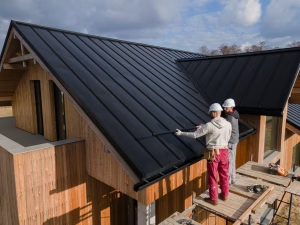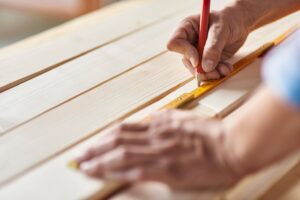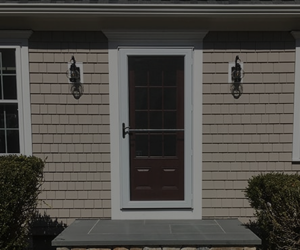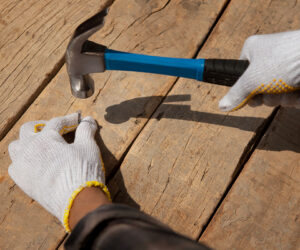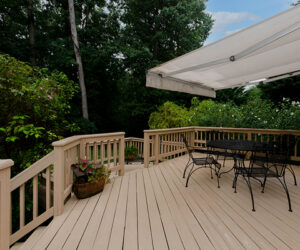How to Start a Deck Building
Dreaming of a custom deck? It all starts with a smart plan. In 2025, with the increasing scope of outdoor entertainment spaces, homeowners are increasingly turning to personalized deck designs to enhance functionality and aesthetic appeal.
Begin by picturing how you’d like to use the space—whether hosting summer barbecues, adding a cozy spot for morning coffee, or creating a play area. From there, decide on the size, materials, and preferred layout that fit your yard and lifestyle. With a clear blueprint in hand, you’ll build with purpose—and avoid costly do‑overs. Let’s map out your dream deck together!
Read this complete guide on how to build a deck from scratch, from planning to maintenance, we’ve covered everything you need before starting a deck building project at your home:
Planning Your Deck Design
Before picking up a hammer, start with a detailed deck design plan. Think about:
- Size & Shape: Plan how much space you can allocate to fit your yard and intended use:
- Leave room for furniture and traffic (standard deck boards are 5½″ wide, so avoid a final narrow strip). A dining area requires more square footage than a small lounge deck.
- Simple, rectangular, or L-shaped decks cost less; complex curves or multi-levels add expense.
- Decide whether the deck will be attached (ledger fastened to the house) or freestanding on its own posts. An attached deck uses fewer posts but needs a properly flashed ledger board to prevent water leaks, while a freestanding deck (set about 1″ from the house) avoids that risk.
- Materials: Choose which type of deck you want, wood, composite, and PVC are the mostly used materials for deck building
- Functionality: Will you be placing a grill, hot tub, fire pit, or outdoor furniture?
- Orientation: Sunlight, wind direction, and privacy from neighbors all affect where your deck should go.
- Size & Shape: Plan how much space you can allocate to fit your yard and intended use:
Using software like SketchUp or deck design apps (like Trex Deck Designer, TimberTech Deck Designer, and the Simpson Strong-Tie Deck Planner) can help you visualize before you build.
- Access: Is there a door leading to the deck? How will you enter from the yard?
- Local Building codes & permits: Check local rules and marking utilities before starting.
- In the US, call 811 (“Call Before You Dig”) to locate underground pipes or wires before digging.
- Verify zoning and HOA (homeowners association) restrictions (setbacks, height limits, etc.) with your building department.
- Consult a professional deck building contractor near you or sketch a plan with dimensions to guide every step.
Choosing Deck Materials
A smart deck material choice ensures your deck looks great, holds up over time, and adds real value to your home. Choose decking material based on durability, aesthetics, and cost:
| Material | Pros | Cons | Durability / Life Span |
| Pressure-treated wood | Affordable, readily available, great for DIY | Requires maintenance, can warp | lasting ~15 years in coastal climates |
| Cedar/Redwood | Naturally resistant to rot | Pricier, needs sealing | last ~20 years |
| Composite decking | Low-maintenance, eco-friendly options | Higher upfront cost, can get hot in direct sunlight | Typically lasts 25 to 30 years |
| PVC decking | Insect/moisture resistant, very low maintenance | Can look less natural, expensive than composite | 25–50 year warranties |
Tip: Opt for high-quality fasteners and corrosion-resistant hardware, especially in coastal or rainy areas like Cape Cod. Use stainless hardware with treated wood, and manufacturer-recommended fasteners with composite/PVC to avoid corrosion.
👉 Read a detailed comparison of Wood deck vs. Composite deck
Tools and Equipment Checklist
Before building, gather these essentials:
- Circular saw
- Drill/driver
- Chalk line
- Post hole digger
- Level
- Hammer
- Measuring tape
- Safety gear (gloves, goggles)
Building a Deck Step-by-Step
Site Preparation and Layout
- Clear the designated area of grass, rocks, and debris.
- Mark the deck’s perimeter using stakes and string.
- Measure and mark where the support posts will go.
- Dig post holes according to local frost depth requirements.
Deck Foundation Options
Choose the right foundation:
- Concrete Footings: Best for permanent, heavy-use decks.
- Deck Blocks: Suitable for small, ground-level decks.
- Pier and Beam: Ideal for uneven or sloped yards.
Ensure everything is level and square before proceeding.
Installing the Deck Frame
- Attach the ledger board to your home’s structure.
- Set posts in concrete footings.
- Install beams across the posts using metal brackets.
- Add joists spaced 16 inches apart for structural support.
This frame is your deck’s skeleton—measure twice, cut once!
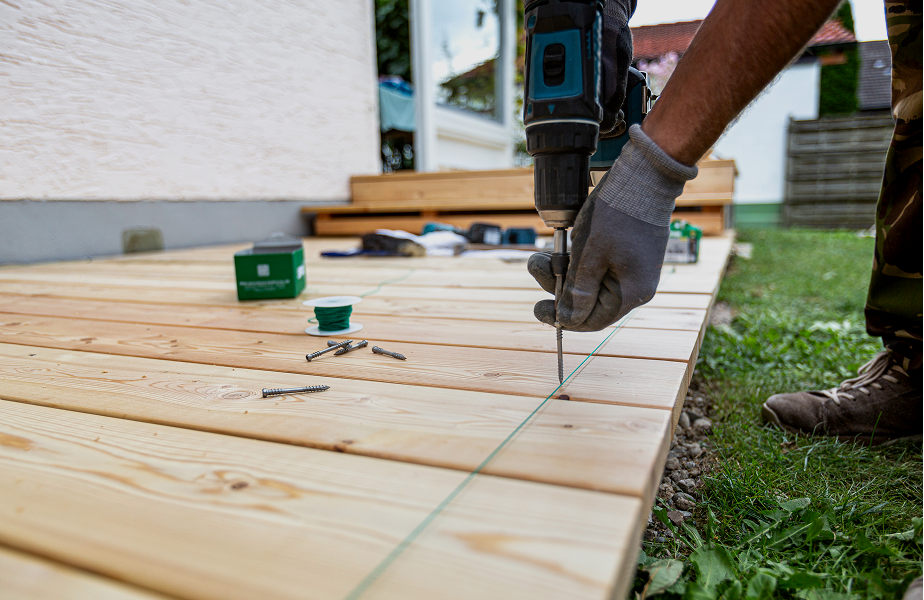
Laying Deck Boards
- Leave 1/8-inch spacing between boards for drainage.
- Use hidden fasteners for a clean look.
- Cut boards with ends landing over joists to prevent sagging.
Stagger your joints to reduce visual seams and warping.
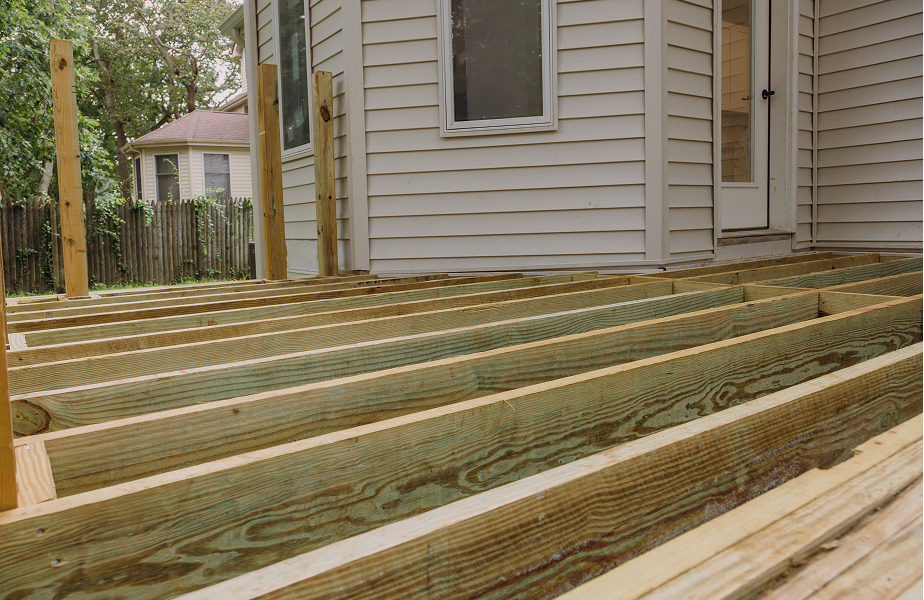
Building Stairs and Railings
- Stairs: Use stringers for support. Standard rise is 7 inches.
- Railings: Required for decks 30″ above ground. Use balusters spaced under 4″ apart.
Railings can also double as a design feature using cables, glass, or wood.
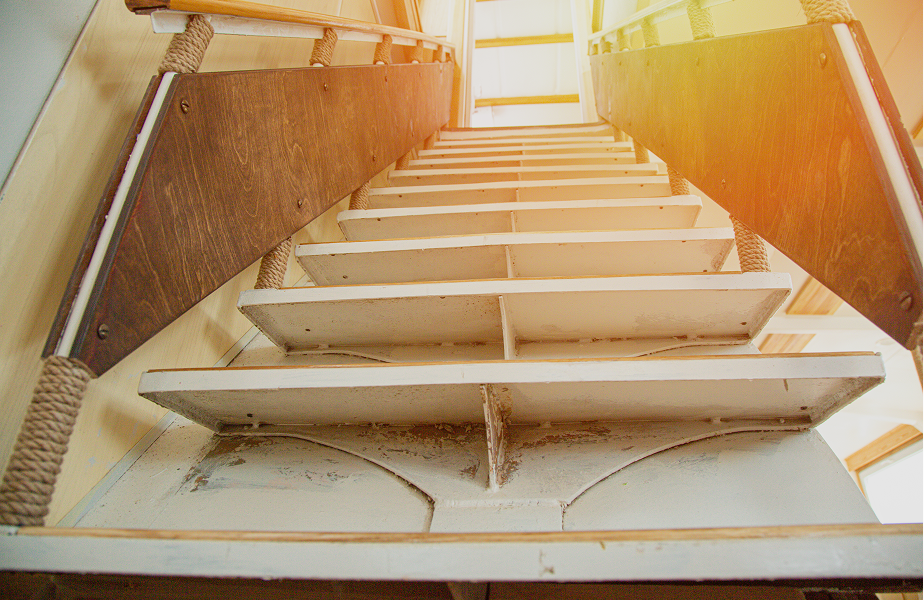
Finishing Touches
Finish with:
- Sanding rough edges
- Applying a UV-resistant stain or waterproof sealant
- Adding lighting, planters, or built-in benches for flair
Cost to Build a Deck in 2025
In 2025, building a deck costs:
- DIY: $15–$30 per square foot
- Professional Install: $30–$60 per square foot
Composite decking may increase upfront costs, but it reduces long-term maintenance. Inflation and material shortages may affect prices, so always get multiple quotes.
Deck Building in Cape Cod
Deck building in Cape Cod requires special consideration due to its coastal environment. Salt air, high humidity, and seasonal storms necessitate the use of corrosion-resistant hardware and moisture-resistant decking materials like composite or PVC. Additionally, local building codes often require elevated footings or storm reinforcements. Builders also factor in historic district regulations that may affect deck styles and finishes. Hiring a Cape Cod general contractor ensures your deck meets regional specifications and aesthetic norms.
Deck Building Trends in 2025
In 2025, homeowners are shifting toward modular deck designs, multi-functional spaces with fire pits, lighting systems, and pergolas. There’s a surge in eco-conscious materials like bamboo and recycled plastics. Smart lighting and Wi-Fi extenders are also gaining popularity as people seek to transform decks into true outdoor “rooms.” Expect to see sleek modern aesthetics replacing traditional styles in urban areas, with Cape Cod homes retaining more rustic or nautical themes.
DIY Deck Building Tips
Going the DIY route? Here are tips for success:
- Start small: Begin with a platform deck if you’re a beginner.
- Measure thrice: Mistakes in measuring can throw off your entire frame.
- Use pre-cut lumber: Saves time and labor.
- Have help: You’ll need at least one other person for lifting beams and joists.
- Watch online tutorials: Many free videos offer step-by-step visual guides.
DIY can save thousands, but requires time, planning, and attention to detail.
Deck Maintenance and Longevity
To keep your deck in top shape:
- Clean debris regularly.
- Restain or seal wood decks every 2–3 years.
- Inspect for loose boards or nails after winter.
- Power wash annually.
Composite decks need less maintenance but should still be cleaned to prevent mildew.
Frequently Asked Questions (FAQs)
- How long does it take to build a deck?
A small DIY deck can take 1–2 weekends. Larger decks may take 2–3 weeks with professional help.
- Do I need a permit to build a deck?
Yes, in most areas, any raised deck or structure attached to a house requires a permit.
- What’s the best material for a long-lasting deck?
Composite decking is best for longevity and low maintenance.
- Can I build a deck directly on the ground?
Yes, a ground-level deck can be built with deck blocks, but ensure proper drainage.
- What is the lifespan of a deck?
With proper maintenance, wood decks last 15–20 years, and composite decks 25–30 years.
- Is building a deck a good investment?
Yes, decks often recoup 70–80% of their cost in home resale value.
Conclusion
Building a deck isn’t just about nailing boards together—it’s a creative, rewarding home addition process that adds beauty and function to your home. With thoughtful planning, the right materials, and some elbow grease (or professional help), your deck can become the outdoor sanctuary you’ve always dreamed of. Whether you’re in Cape Cod or anywhere else in 2025, smart design and careful construction are the keys to a lasting structure.



